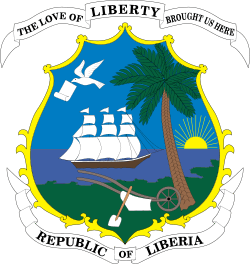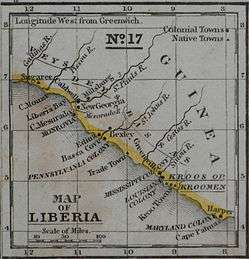Liberian independence referendum, 1846
 |
| This article is part of a series on the politics and government of Liberia |
|
Judiciary |
An independence referendum was held in Liberia on 27 October 1846. The result was 52% in favour,[1] with independence being declared on 26 July 1847. During the mid-19th century, there were continuous clashes between Liberian government and British merchants from Sierra Leone over payment of taxes, with the merchants arguing that the country had no right to impose taxes.
A constitutional referendum was held the following year, with voters approving an increase in the executive powers to the President and the bicameral legislature.
Background

In the United States, there was a movement to resettle free-born blacks and freed slaves, in Africa, believing blacks would face better chances for freedom in Africa than in the United States where their rights were still restricted.[2] The American Colonization Society (ACS) was founded in 1816 in Washington, D.C. for this purpose, by a group of prominent politicians and slaveowners.[3] Most African-Americans, who were native-born by this time, wanted to work toward justice in the United States rather than emigrate.[2] The ACS, supported by prominent American politicians such as Abraham Lincoln, Henry Clay, and James Monroe, believed repatriation of free African-Americans was preferable to widespread emancipation of slaves.[3] Similar state-based organizations established colonies in Mississippi-in-Africa and the Republic of Maryland, which were later annexed by Liberia.
In 1822, the ACS began sending African-American volunteers to the Pepper Coast to establish a colony for African-Americans. By 1867, the ACS (and state-related chapters) had assisted in the migration of more than 13,000 African-Americans to Liberia.[4] These free African-Americans and their descendants married within their community and came to identify as Americo-Liberians. Many were of mixed race and educated in American culture; they did not identify with the indigenous natives of the tribes they encountered. They intermarried largely within the colonial community, developing an ethnic group that had a cultural tradition infused with American notions of political republicanism and Protestant Christianity.[5] They knew nothing of the indigenous cultures, languages or animist religion. Encounters with tribal Africans in the bush often developed into violent confrontations. The colonial settlements were raided by the Kru and Grebo from their inland chiefdoms. Because of feeling set apart and superior by their culture and education to the indigenous people, the Americo-Liberians developed as a small elite that held on to political power. It excluded the indigenous tribesmen from birthright citizenship in their own lands until 1904, in a repetition of the United States' treatment of Native Americans.[6]
Many Liberians, especially the rich who were affected by the continuous regression by ACS, began to seek independence. During the mid-19th century, there were also continuous clashes between Liberian government and British merchants from Sierra Leone, with the merchants arguing that the country had no right to impose taxes. The elites in the colony wanted to declare sovereignty to overcome the issue, resulting in the declaration.
Results
| Choice | Votes | % |
|---|---|---|
| For | 52 | |
| Against | 48 | |
| Total | 100 | |
| Registered voters/turnout | 66 | |
| Source: Direct Democracy | ||
Aftermath
On 26 July 1847, the settlers issued a Declaration of Independence and the better-organized political faction led by Joseph Jenkins Roberts who would go on to become the first President of Liberia won the struggle.[7][8] A constitution was also promulgated based on the political principles denoted in the United States Constitution.[9][10]
References
- ↑ "Elections in Liberia". African Elections. Retrieved 28 October 2016.
- 1 2 "Background on conflict in Liberia". Friends Committee on National Legislation. July 30, 2003. Retrieved 29 October 2016.
- 1 2 Maggie Montesinos Sale (1997). The Slumbering Volcano: American Slave Ship Revolts and the Production of Rebellious Masculinity, Duke University Press, 1997, p. 264. ISBN 0-8223-1992-6
- ↑ "The African-American Mosaic". Government of Liberia. Retrieved March 31, 2015.
- ↑ Wegmann, Andrew N (May 5, 2010). "Christian Community and the Development of an Americo-Liberian Identity, 1824–1878". Louisiana State University.
- ↑ U.S. State Department. "Liberia".
- ↑ Cavanagh, Edward; Veracini, Lorenzo, eds. (2016). The Routledge Handbook of the History of Settler Colonialism. Routledge. p. 460. ISBN 9781134828548.
- ↑ Rodriguez, Junius P. (2015). Encyclopedia of Emancipation and Abolition in the Transatlantic World. Routledge. p. 1128. ISBN 9781317471790.
- ↑ Johnston, Harry Hamilton; Stapf, Otto (1906). Liberia, Volume I. Hutchinson & Co,. ISBN 1-143-31505-7.
- ↑ Adekeye Adebajo (2002). "Liberia's Civil War: Nigeria, ECOMOG, and Regional Security in West Africa". International Peace Academy. p. 21. ISBN 1588260526.